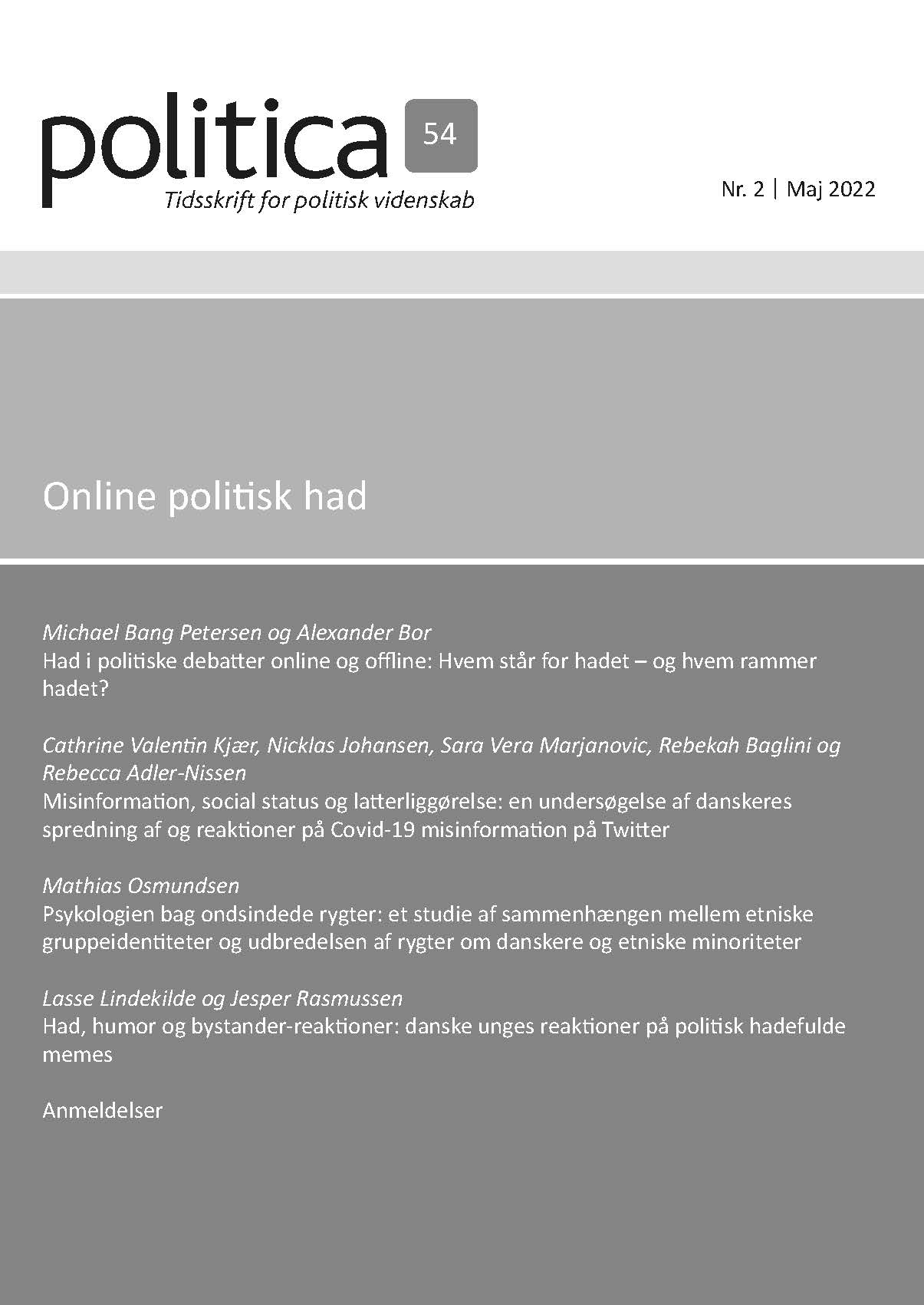Had i politiske debatter online og offline: Hvem står for hadet – og hvem rammer hadet?
DOI:
https://doi.org/10.7146/politica.v54i2.132520Nøgleord:
sociale medier, politiske debatter, had, personlighedResumé
Hadefuld adfærd på de sociale medier i forbindelse med eksempelvis politiske diskussioner anses for et stigende samfundsproblem. I denne artikel spørger vi: Hvem er udøverne af det politiske had på internettet – og hvem er ofrene? Og er udøverne af og ofrene for had anderledes på internettet end udenfor internettet? Analyserne viser, at de personer, som optræder hadefuldt og rammes af had i forbindelse med politiske diskussioner, i høj grad er de samme både online og offline. Aggressiv adfærd er generelt mere udbredt blandt unge mænd, og analyserne viser, at det også først og fremmest er unge mænd, der optræder hadefuldt både online og offline. I overensstemmelse med viden om aggression generelt retter hadet sig også først og fremmest mod andre unge mænd. Internethad ser således ikke ud til at være en særlig form for had eller aggressivitet. De, der er aggressive offline, er også aggressive online, og de går efter de samme ofre begge steder.
Referencer
Baek, Young Min, Magdalena Wojcieszak og Michale X. Delli Carpini (2012). Online versus face-to-face deliberation: Who? Why? What? With what effects? New Media & Society 14 (3): 363-383.
Baltes, Boris B., Marcus W. Dickson, Michael P. Sherman, Cara C. Bauer og Jacqueline S. LaGanke (2002). Computer-mediated communication and group decision making: A meta-analysis. Organizational Behavior and Human Decision Processes 87 (1): 156-179.
Bartusevičius, Henrikas, Florian van Leeuwen og Michael Bang Petersen (2020). Dominance-driven autocratic political orientations predict political violence in Western, educated, industrialized, rich, and democratic (WEIRD) and non-WEIRD samples. Psychological Science 31 (12): 1511-1530.
Barberá, Pablo (2020). Social media, echo chambers, and political polarization, pp. 34-55 i Nathaniel Persily og Joshua A. Tucker (red.), Social media and democracy: The state of the field, prospects for reform. Cambridge: Cambridge University Press.
Bohnet, Iris og Bruno S. Frey (1999). The sound of silence in prisoner’s dilemma and dictator games. Journal of Economic Behavior & Organization 38 (1): 43-57.
Bor, Alexander og Michael Bang Petersen (2021). The psychology of online political hostility: A comprehensive, cross-national test of the mismatch hypothesis. American Political Science Review 116 (1): 1-18. http://doi.org/10.1017/S0003055421000885.
Borkan, Daniel, Lucas Dixon, Jeffrey Sorensen, Nithum Thain og Lucy Vasserman (2019). Nuanced metrics for measuring unintended bias with real data for text classification, pp. 491-500 i Companion proceedings of the 2019 World Wide Web Conference. http://dx.doi.org/10.1145/3308560.3317593.
Brady, William J., M.J. Crockett og Jay J. Van Bavel (2020). The MAD model of moral contagion: The role of motivation, attention, and design in the spread of moralized content online. Perspectives on Psychological Science 15 (4) : 978-1010.
Buckels, Erin E., Paul D. Trapnell og Delroy L. Paulhus (2014). Trolls just want to have fun. Personality and individual Differences 67: 97-102.
Buss, David M. og Lisa A. Dedden (1990). Derogation of competitors. Journal of Social and Personal Relationships 7 (3): 395-422.
CfDP (2020). The angry internet: A threat to gender equality, democracy & well-being. Centre for Digital Youth Care.
Cheng, Justin, Michael Bernstein, Christian Danescu-Niculescu-Mizil og Jure Leskovec (2017). Anyone can become a troll: Causes of trolling behavior in online discussions, pp. 1217-1230 i Proceedings of the 2017 ACM Conference on Computer Supported Cooperative Work and Social Computing. https://doi.org/10.1145/2998181.2998213.
Grossman, Lev (2010). Mark Zuckerberg. Time Magazine, December, 15.
Kim, Jin Woo, Andrew Guess, Brendan Nyhan og Jason Reifler (2021). The distorting prism of social media: How self-selection and exposure to incivility fuel online comment toxicity. Journal of Communication 71 (6): 922-946.
Kyvsgaard, Britta (2000). Offerstatistisk og statistik om gerningssituationen for personfarlig kriminalitet. Justitsministeriet. https://www.justitsministeriet.dk/sites/default/files/media/Arbejdsomraader/Forskning/Forskningsrapporter/2000/Offerstatistik_og_statistik.pdf
Megarry, Jessica (2014). Online incivility or sexual harassment? Conceptualising women’s experiences in the digital age. Women’s Studies International Forum 47: 46-55.
Mutz, Diana C. (2018). Status threat, not economic hardship, explains the 2016 presidential vote. Proceedings of the National Academy of Sciences 115 (19): E4330-E4339.
Papacharissi, Zizi (2004). Democracy online: Civility, politeness, and the democratic potential of online political discussion groups. New Media & Society 6 (2): 259-283.
Petersen, Michael Bang (2010). Indekskonstruktion, pp. 393-413 i Lotte Bøgh Andersen, Kasper Møller Hansen og Robert Klemmensen (red.), Metoder i statskundskab. København: Hans Reitzel Forlag.
Petersen, Michael Bang, Mathias Osmundsen og Alexander Bor (2021). Beyond populism: The psychology of status-seeking and extreme political discontent, pp. 62-80 i Joseph P. Forbas, William D. Crano og Klaus Fiedler (red.), The psychology of populism: The tribal challenge to liberal democracy. Routledge.
Pratto, Felicia, Jim Sidanius, Lisa M. Stallworth og Bertram F. Malle (1994). Social dominance orientation: A personality variable predicting social and political attitudes. Journal of Personality and Social Psychology 67 (4): 741-763.
Thomsen, Lotte, E. Green og Jim Sidanius (2008). We will hunt them down: How social dominance orientation and right-wing authoritarianism fuel ethnic persecution of immigrants in fundamentally different ways. Journal of Experimental Social Psychology 44 (6): 1455-1464.
Trygfonden (2017). Ytringsfrihed og digital usikkerhed. Trygfonden.
TV2 (2014). Ekspert: Derfor taler folk grimt til hinanden på Facebook. https://nyheder.tv2.dk/samfund/2014-11-14-ekspert-derfor-taler-folk-grimt-til-hinanden-paa-facebook, 14. november.
Twenge, Jean M., Roy F. Baumeister, Dianne M. Tice og Tanja S. Stucke (2001). If you can’t join them, beat them: Effects of social exclusion on aggressive behavior. Journal of Personality and Social Psychology 81 (6): 1058-1069.
Wilson, Margo og Martin Daly (1985). Competitiveness, risk taking, and violence: The young male syndrome. Ethology and Sociobiology 6 (1): 59-73.
Downloads
Publiceret
Citation/Eksport
Nummer
Sektion
Licens
LicensOphavsretten tilhører Politica. Materialet må ikke bruges eller distribueres i kommercielt øjemed.





